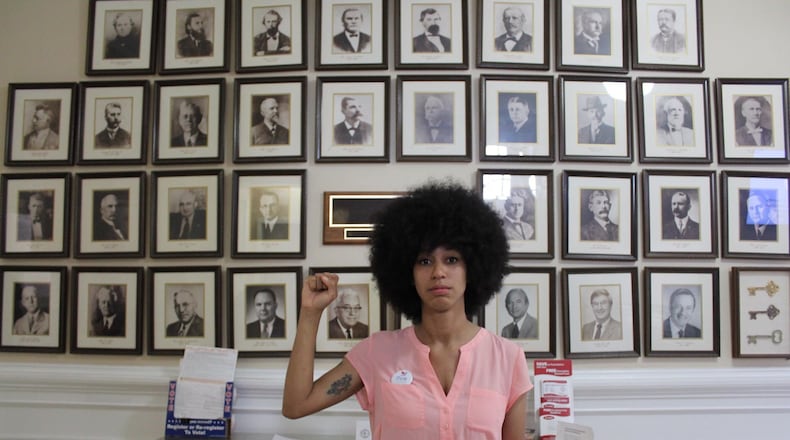An Athens-Clarke County commissioner is looking to shrink the local police department by 50% during the next decade and replace that personnel with mental health and social work first responders.
Mariah Parker, who chose a copy of Malcolm X's autobiography, rather than a Bible, for her 2018 inauguration, is proposing spending $50,000 on a study on how to make that transition, a proposal that is set for a June 16 vote.
“Not only will this prevent police violence but it will also lead to many cost savings for the city to reinvest those funds in more appropriate manners that benefit the community,” Parker said.
Parker points to an April crime analysis by the Athens-Clarke County Police Department that shows declining crime rates despite the department being short-handed.
According to the report, crimes against people are down 2.4%; crimes against property are down almost 20%; and crimes against society are down more than 25%, all within the last year.
“Several crime types are down significantly from 2019 YTD such as robbery (-44.9%); all burglaries (-16.6%); and others,” the report said. The department also said so far this year no homicides have been reported; there have been three fewer rapes; and assault crimes are decreasing.
Commissioners are working on their FY 2021 budget, Parker said. Her plan also includes raises for public defenders; assigning a social worker to the police department; and adding a full-time, mental health response team that will be staffed around the clock.
»MORE: How Mariah Parker and the left set off a political earthquake in Athens
“The $50,000 is for a working study that would be composed of policy experts from across the nation, to look at governments that have reduced the size of their police departments,” Parker said. “There is longstanding research that shows having more cops on the street doesn’t translate into less crime.
“If people get their individual needs met, most people won’t commit crimes like breaking and entering and robbery.”
Demonstrations and protests for George Floyd, an African American man who died in Minneapolis while in police custody, have given rise to movements advocating the defunding of police.
“Defunding the police sounds very scary,” Parker said. “But I ran on a platform of stopping crime at its root, and this is the first time I’ve been able to concretize the issue into a substantive plan.”
Supporters of defunding police departments say it isn’t about eliminating those departments or stripping agencies of all their money. They say it is time for the country to address systemic problems in policing in America and spend more on what communities across the U.S. need, such as housing and education.
State and local governments spent $115 billion on policing in 2017, according to data compiled by the Urban Institute.
“Why can’t we look at how it is that we reorganize our priorities, so people don’t have to be in the streets during a national pandemic? Black Lives Matter co-founder Alicia Garza asked during an interview on NBC’s “Meet the Press.”
Activists acknowledge this is a gradual process.
The group MPD150, which says it is “working towards a police-free Minneapolis,” argues that such action would be more about “strategically reallocating resources, funding, and responsibility away from police and toward community-based models of safety, support, and prevention.”
“The people who respond to crises in our community should be the people who are best-equipped to deal with those crises,” the group wrote on its website.
President Donald Trump and his campaign view the emergence of the “Defund the Police” slogan as a spark of opportunity during what has been a trying political moment. Trump’s response to the protests has sparked widespread condemnation. But now his supporters say the new mantra may make voters, who may be otherwise sympathetic to the protesters, recoil from a “radical” idea.
Credit: Courtesy of Mariah Parker
Credit: Courtesy of Mariah Parker
Images of Parker’s swearing-in flooded social media at the time of her inauguration. On the steps of the Athens City Hall, Parker cocked her right fist in the air and placed her left hand on a well-worn copy of “The Autobiography of Malcolm X,” held by her mother Mattie Parker.
“They asked if they would like the Bible, and I said no,” Parker said at the time. “My mother asked if there was a copy of the Constitution around. ‘No,’ ” Parker said. “I wanted Malcolm’s book. I think they saw it coming.”
Parker was struck by the parallels between her life and Malcolm X. She grew up poor in rural Kentucky. She struggled with substance abuse and mental health issues.
“I was very lucky to break away from some of the generational patterns, by going to college and getting out of the town,” said Parker. “But I struggled, and I thought people only looked at me as having nothing to offer.”
A progressive, who describes herself as openly queer, Parker was motivated to run for office because she saw a need for vocal leadership.
Parker won the District 2 seat in Athens by 13 votes, running on a platform of economic justice, reducing poverty and discrimination, affordable housing, fair wage jobs, youth development, criminal justice reform and marijuana reform.
Her district is an economically struggling swath of east Athens that lacks some of the same amenities that other parts of town enjoyed.
About the Author
The Latest
Featured


